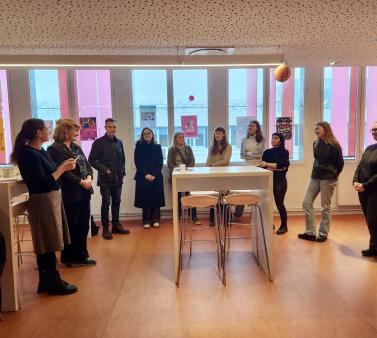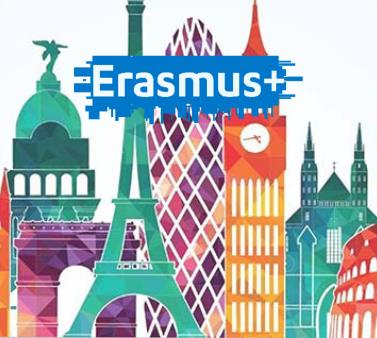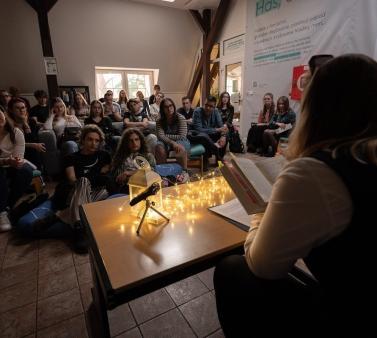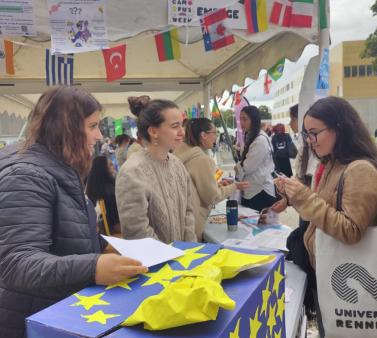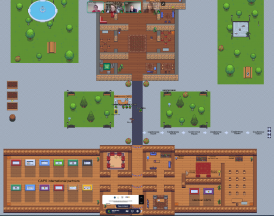
The CAPS community on their virtual meeting space on Gather town.
On April 19th and 20th, teachers and researchers of the CAPS program welcomed their international higher education partners in a creative virtual meeting space to discuss the next steps in the roll out of the international arts-centered teaching and research program developed by Rennes 2 University in partnership with the Ecole européenne d’art de Bretagne (EESAB) European Academy of Art in Brittany the Ecole nationale supérieure d’architecture de Bretagne(ENSAB) and the French National Centre for Scientific Research (CNRS). The goal of the conference was to provide a forum to explore important questions on the structure and methods to be used as the program expands its interdisciplinary modules at the MA and PhD levels with local and international partners.
At the heart of its program, CAPS focuses on innovative, creative ways of experimenting in academic research, teaching and action, all within public space. It also seeks to connect students, teachers and researchers with civic and public actors, creating new encounters with communities from within the university environment, and outside of it, with creativity at the center of any related actions.
A round of trial interdisciplinary modules were first organized in September of 2020 and will continue in September 2021. CAPS is seeking to bring together more than 70 researchers from twelve Rennes 2 and ENSAB research units for future doctoral students. In September 2021, the first CAPS-funded doctorates will begin, and in September 2022, the program will launch the open-MA programme.
During the conference welcome address, Dr. Lesley Lelourec, Rennes 2 Vice-President in charge of Internationalisation, and Dr. Marion Hohlfeldt, Director of the CAPS, spoke about the importance of the CAPS goal of combining a creative imagination, critical thinking, and interdisciplinary collaboration through a shared vision and approach with their international partners.
Internationally, the CAPS program includes participation from the following universities:
- University of Barcelona, Spain
- Queen's University, Belfast, UK
- University College Cork, Ireland
- IADT Dublin, Ireland
- Goldsmiths University of London, UK
- Leuphana University, Germany
- KHiO Oslo National Academy of the Arts, Norway
- University of Arts, Poznan, Poland
- Bauhaus University, Germany
- Concordia University, Canada
- Texas State University, US
- Swinburne University of Technology, Australia
Creativity and pedagogical innovation
During the first workshop, Dr. Helene Bailleul, Head of Training for CAPS, reminded the participants the importance of keeping the multiple goals of the teaching programs in mind throughout the two-days: “We will focus on a student-centred curriculum, and a challenge-based approach. Our aim today is to share innovative teaching formats or initiatives used amongst our partners and discuss potential solutions based on each of our experiences in order to build common pedagogical tools we can share in the future”.
Some of the key questions discussed amongst participants included: How to best bring together art and theory, and, in particular, what can art teach us in terms of cultural theory and cultural studies? Within the niche of public space and civic space, how can space divide or bring people together, including theories of symbols? How does one approach art with no audience and what are the best digital tools that can help to bring people together and yet provide performers with creative control? What are the best ways to teach interdisciplinary methods, and operationally, what are the different ways to ensure that students are supported as they navigate through traditional lines of different disciplines?
New research formats and shared research methods
Interdisciplinarity was also one of the important topics discussed during the research segment of the conference. The program, which will mainly focus mainly on Arts, Social Sciences and Humanities, will look to establish a structured approach in which projects can be undertaken, even with subjects as diverse as say, sustainable development or technology, sustainability, art and design.
Participants also noted the need to create a format, where specialists, artists, and others could openly work together, and where different outcomes and distributions could be treated as a common research topic for all CAPS partners. Dr. Marion Hohlfeldt stated that this is something that could be experimented with in the new CAPS Rennes-based research studios, Le Bois-Perrin. Since March 2021, the City of Rennes has made available to CAPS two buildings on the Perrin block, an ideal place to launch the University's first off-site actions. This former site of the Guillaume REGNIER hospital will give rise to a new district by 2025. The presence of CAPS will take shape through student projects, actions by their partners and events to connect university research with society. With three integrated research studios, it will be a useful illustration of how to work with public spaces in order to create a “third space”. “These studios will be a space dedicated to the sharing of knowledge on common topics, student projects, artistic residencies, as well as PhD and post-doctoral students,” said Professor Anne Goarzin, Head of Research for CAPS.
The CAPS Rennes-based location for research studios, le Bois-Perrin.
Finding a common approach to mobility between partners
One subject on which the teams will continue working is the construction of frameworks which will facilitate mobility opportunities between partners. Making use of the new Erasmus shorter mobilities programs might open up new forms of opportunities between eligible institutions.
Participants noted however, that for students from outside of the EU, international mobility opportunities are more likely to be hindered by legal questions related to visa requirements. In cases such as this, the teams evoked the possibility of finding ways to increase virtual mobilities, as is currently the case between Rennes 2 University and Texas State University.
As the conference concluded, the CAPS team discussed their objective of opening research internship opportunities in the future Rennes-based research studios as well the development of nomadic or itinerant workshops and shared hybrid symposiums.
To find out more about these discussions or other information on the CAPS program, please see their website.

